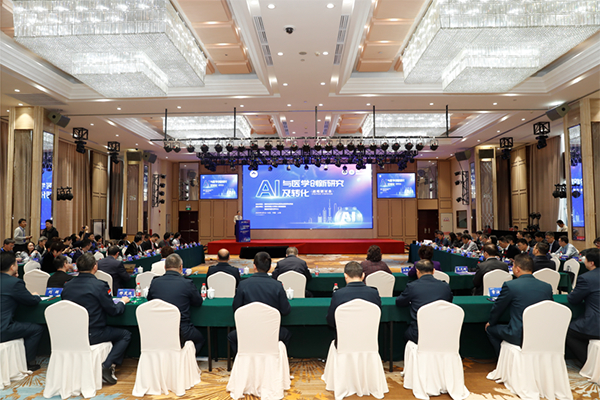

On March 12-14, 2025, the "AI and Medical Innovation Research and
Transformation" strategic seminar of the Medical Science Department of the
National Natural Science Foundation of China was held in Shanghai. The meeting
was hosted by the Medical Science Department of NSFC, and undertaken by the
Third Affiliated Hospital of Naval Medical University of the People's Liberation
Army and the National Liver Cancer Science Center. Wang Hongyang, academician of
the Naval Medical University of the People's Liberation Army, Bian Xiuwu,
academician of the Army Medical University of the People's Liberation Army, Fan
Xianqun, academician of the School of Medicine of Shanghai Jiaotong University,
and Zheng Hairong, academician of the Shenzhen Institute of Advanced Technology
of the Chinese Academy of Sciences, served as the chairman of the meeting. Zhang
Xuemin, member of the Party Group and Deputy Director of the National Natural
Science Foundation of China, Gao Ruiping, Secretary General of the Advisory
Committee of the National Natural Science Foundation of China, and Qiao Jie,
Director of the Medical Science Department of the National Natural Science
Foundation of China, attended the meeting and delivered speeches. Hong Wei,
Deputy Director of the Department of Medical Sciences, presided over the opening
ceremony.
Vice Director Zhang Xuemin pointed out in his speech that with the
continuous breakthroughs in artificial intelligence (AI) technology, medical
development is facing significant opportunities and profound changes. Zhang
Xuemin emphasized the need to adhere to the correct value orientation, promote
the true intersection of artificial intelligence and cutting-edge medical
research, and hoped that the attending experts would focus on practical clinical
scenarios, condense key scientific issues of interdisciplinary integration, in
order to achieve outstanding medical innovation and serve the major strategic
needs of the country.
Secretary General Gao Ruiping briefly introduced the background and
preliminary work of the project topic, and stated in his speech that the topic
proposal put forward by the National Natural Science Foundation of China should
be based on the positioning of the national key research and development plan
and the new era responsibilities and missions of the National Natural Science
Foundation of China, with the "four orientations" as the fundamental principle,
committed to promoting the deep coupling of basic research, cutting-edge
technology and national major needs, reflecting strategic, fundamental and
forward-looking, and should pay attention to the differences from the layout of
existing national science and technology major projects.
Director Qiao Jie emphasized in his speech that artificial intelligence
technology is reshaping the paradigm of medical research at an unprecedented
speed, and exploring the intersection and integration of artificial
intelligence, a thriving emerging field, with life and health is crucial for
promoting clinical and scientific research development. How to make artificial
intelligence truly serve clinical needs and solve patient pain points, rather
than staying at the level of "technology idling" or "conceptual packaging", is
the core proposition we must answer. We look forward to the experts attending
the meeting to discuss and condense key scientific issues in this field.
This conference focused on four topics: "AI Empowered Exploration and
Mechanism Analysis of Disease Essence", "AI Assisted Multi omics Data Fusion and
Precision Diagnosis", "AI Assisted Personalized Treatment Plan Development and
Decision making", and "AI Accelerated New Drug Target Discovery, Design, and
Development". Four conference reports and 29 special reports were arranged.
Experts attending the meeting suggested that the correlation and fusion of
multidimensional and multimodal medical data should be promoted, and attention
should be paid to the molecular mechanism analysis of complex diseases empowered
by artificial intelligence; Develop a large model for cross modal image text
fusion, based on artificial intelligence multimodal omics technology to carry
out disease diagnosis, classification, and prognosis judgment; Develop new
technologies and strategies for disease treatment assisted by artificial
intelligence based on temporal and multimodal data; Utilizing artificial
intelligence to improve the efficiency and accuracy of new target discovery,
dynamic structure prediction of drug targets, drug screening, and
optimization.
More than 30 experts from universities and research institutes across the
country, as well as staff from relevant departments of the National Natural
Science Foundation of China, attended the meeting.